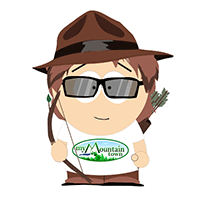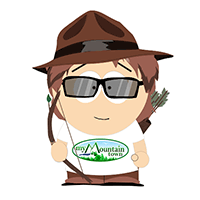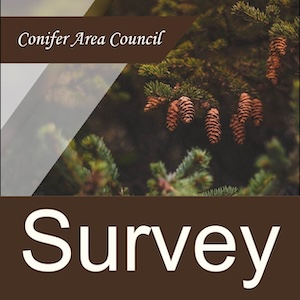- Posts: 15746
- Thank you received: 320
Snowpack declines in Rockies unusual compared to past
- ScienceChic
-
 Topic Author
Topic Author
- Mountain Champion
-

Snowpack declines in Rockies unusual compared to past
The researchers evaluated the recent declines using snowpack reconstructions from 66 tree-ring chronologies, looking back 500 to more than 1,000 years.
June 9, 2011
The study (subscription req'd): http://www.sciencemag.org/content/early ... 0.full.pdfThe reduction in snowpack in the Rocky Mountains over the last 30 years is unusual compared to the past few centuries, according to a new study that includes University of Arizona researchers. Previous studies attribute the decline to unusual springtime warming, more precipitation falling now as rain rather than snow and earlier snowmelt. The warming and snowpack decline are projected to worsen through the 21st century, foreshadowing a strain on water supplies.
The researchers evaluated the recent declines using snowpack reconstructions from 66 tree-ring chronologies, looking back 500 to more than 1,000 years. The network of sites was chosen strategically to characterize the range of natural snowpack variability over the long term, and from north to south in the Rocky Mountains.
With a few exceptions (the mid-14th and early 15th centuries), the snowpack reconstructions show that the northern Rocky Mountains experience large snowpacks when the southern Rockies experience meager ones, and vice versa. Since the 1980s, however, there were simultaneous declines along the entire length of the Rocky Mountains, and unusually severe declines in the north.
This study supports research by others estimating that between 30-60 percent of the declines in the late 20th century are likely due to greenhouse gas emissions. The remaining part of the trend can be attributed to natural decadal variability in the ocean and atmosphere, which is making springtime temperatures that much warmer.
Edit to add: the final publication http://www.sciencemag.org/content/333/6040/332.full
"Now, more than ever, the illusions of division threaten our very existence. We all know the truth: more connects us than separates us. But in times of crisis the wise build bridges, while the foolish build barriers. We must find a way to look after one another as if we were one single tribe.” -King T'Challa, Black Panther
The truth is incontrovertible. Malice may attack it. ignorance may deride it, but in the end, there it is. ~Winston Churchill
Please Log in or Create an account to join the conversation.
- FredHayek
-

- Mountain Legend
-

- Posts: 30768
- Thank you received: 179
Less snow, and more spring rains sound much better for the wildlife. Not getting nearly as much winter kill on elk and deer herds.
Thomas Sowell: There are no solutions, just trade-offs.
Please Log in or Create an account to join the conversation.
- Photo-fish
-

- Mountain Legend
-

- Posts: 3975
- Thank you received: 14
Spring rains do not soak in as well as snowpack and cause more erosion problems. It is easier for water providers to forcast their supply using snowpack than it is to depend on spring rains that may or may not fill their reservoirs. Less snow and more spring rains mean warmer water temperatures in our creeks, rivers and reservoirs. This effects the population of native and resident fish (cutthroats and brookies). It also effects native flora and fauna.
The birds that you are now seeing at 10,000 feet are encroaching in areas that did not normally see them. This causes competition with those that are native to that environment. As one or to families of plants or animals appear to thrive, there will be others that will decline as a result.
´¯`•.. ><((((º>`•´¯`•...¸><((((º> ´¯`•.. ><((((º>`´¯`•...¸><((((º>´¯`•.. ><((((º>`•´¯`•...¸><((((º> ´¯`•.. ><((((º>`•.´¯`•...¸><((((º>
Please Log in or Create an account to join the conversation.
- deltamrey
-

- Mountain Legend
-

- Posts: 1130
- Thank you received: 7
Please Log in or Create an account to join the conversation.
- Photo-fish
-

- Mountain Legend
-

- Posts: 3975
- Thank you received: 14
´¯`•.. ><((((º>`•´¯`•...¸><((((º> ´¯`•.. ><((((º>`´¯`•...¸><((((º>´¯`•.. ><((((º>`•´¯`•...¸><((((º> ´¯`•.. ><((((º>`•.´¯`•...¸><((((º>
Please Log in or Create an account to join the conversation.
- FredHayek
-

- Mountain Legend
-

- Posts: 30768
- Thank you received: 179
We were warned that humans were driving wildlife away with home building, but I am seeing wildlife adapting pretty quickly to suburban and urban enviroments.
Instead of having 3 bad winters out of 5, we will see 2. Will that be a radical change, or just slight adjustments?
Thomas Sowell: There are no solutions, just trade-offs.
Please Log in or Create an account to join the conversation.
- Rick
-

- Mountain Legend
-

- Posts: 15598
- Thank you received: 163
The left is angry because they are now being judged by the content of their character and not by the color of their skin.
Please Log in or Create an account to join the conversation.
- AV8OR
-

- Mountain Legend
-

- Posts: 1071
- Thank you received: 0
How's those false reports on global warming working out???
Please Log in or Create an account to join the conversation.
- Photo-fish
-

- Mountain Legend
-

- Posts: 3975
- Thank you received: 14
:Whatever:AV8OR wrote: Likes like more Tree-hugging hippie B.S.
How's those false reports on global warming working out???
This tree hugger hippie would like to share some pictures of what I personally observed this past Friday.
I do not EVER remember Summit Lake being this low in June. Yes there is still some snow up there to melt, but please observe how low the lake is right now and that there is absolutely NO water running in the drainage below the lake. This is the same on the other side off of Guanella.
I don't think you need to be a "Hippie" or a "tree-hugger" to have some concern about the trend we are experiencing.
´¯`•.. ><((((º>`•´¯`•...¸><((((º> ´¯`•.. ><((((º>`´¯`•...¸><((((º>´¯`•.. ><((((º>`•´¯`•...¸><((((º> ´¯`•.. ><((((º>`•.´¯`•...¸><((((º>
Please Log in or Create an account to join the conversation.
- lionshead2010
-

- Mountain Legend
-

- Posts: 789
- Thank you received: 0
No question about it. It has been a dry season on the Eastern Slope. At the same time La Nina brought a bounty of snow to the Western Slope. Let's hope summer monsoons bring us plenty of summer rain and next winter's weather pattern shifts to favor the Eastern Slope more. It seems though that the Eastern Slope tends to just be drier most of the winter. Those darned prevailing winds have and will continue to carry moisture to our Western Slope each winter...and by the time the clouds pass over our majestic Rockies, they are rung out and dry. Sometimes storms tracking across the southern part of our state bless us with moisture laden up-slope winds. La Nina made sure that didn't happen much this past winter.
If not, I'm not sure what to do about it, do you? I mean really.....what do you propose to do? Just curious.
I say we accept the change (not unlike what's going on with our economy) and try to find ways to survive and thrive despite the change. I don't see government or any other mortal powers doing much about either phenomenon...and if the world is ending, I'd sure like to enjoy my last days here without wringing my hand's all the time.
Please Log in or Create an account to join the conversation.










